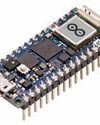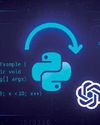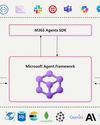يحاول ذهب - حر
Popular Free Platforms for Developing AI Chatbots
August 2024
|Open Source For You
Almost all medium and large businesses are using AI chatbots to interact with clients and understand their needs better. Several open source and free platforms can be used to build and enhance the functioning of these chatbots. You can choose from these.

Web development is a confluence of various disciplines, including graphic design, interface design, user experience, client-side and serverside scripting, and network security configuration. The process begins with the foundational aspect of web design, which involves crafting the visual aesthetics and functional layout. This phase necessitates a deep understanding of both graphic design principles and human-computer interaction paradigms to ensure that the product is both visually appealing and intuitively navigable.
The subsequent phase, web programming, is where the conceptual designs are transformed into a tangible, interactive platform. This stage leverages a plethora of programming languages and frameworks, such as HTML, CSS, JavaScript and their associated libraries and pre-processors, which collectively bring static designs to life through dynamic content and interactive elements.
Server-side programming, involving languages like Python, Ruby, PHP and their corresponding frameworks, such as Django, Ruby on Rails and Laravel, plays a crucial role in managing the backend operations, including data storage, user authentication and server communication.
The significance of web development is underscored by its extensive range of use cases, which permeate virtually every sector of modern society.
E-commerce:
هذه القصة من طبعة August 2024 من Open Source For You.
اشترك في Magzter GOLD للوصول إلى آلاف القصص المتميزة المنسقة، وأكثر من 9000 مجلة وصحيفة.
هل أنت مشترك بالفعل؟ تسجيل الدخول
المزيد من القصص من Open Source For You

Open Source For You
Lux: Excellence in Data Analysis and Visualisation
Data is sacred in today's world, and Python libraries like Lux make data analysis and visualisation so much easier.
2 mins
January 2026

Open Source For You
The Role of Open Source in Building Modern Data Infrastructure
It's no secret that open source is emerging as the backbone of modern data infrastructure. Here’s a list of the core open source technologies used to deploy this infrastructure, along with some real-world examples and a brief on why open source matters.
3 mins
December 2025

Open Source For You
The Whispering Machines: How Open Source is Bringing Intelligence to the Tiniest Devices
Built on open source frameworks, TinyML is enabling complex machine learning models to run on the microcontrollers embedded in connected devices, bringing artificial intelligence to the very edge of the network.
3 mins
December 2025

Open Source For You
Setting Up Snort to Secure Your Network
Snort is a popular, open source intrusion detection system that monitors traffic in real time to detect malware. Here’s a detailed explanation of how to set it up on Ubuntu and test it by generating traffic from another system.
7 mins
December 2025

Open Source For You
When AI Meets DevOps to Build Self-Healing Systems
Traditional DevOps, with its rule-based automation, is struggling to work effectively in today’s complex tech world. But when combined with AlOps, it can lead to IT systems that predict failures and solve issues without human intervention.
7 mins
December 2025

Open Source For You
How to Automate Java Code Modernisation
This short guide illustrates that automating Java code modernisation with Python and OpenAI API is not just possible-it's remarkably effective.
5 mins
December 2025

Open Source For You
The Quest to Build a Quantum Computer
The road to large-scale quantum computing is long and hard, with incremental advances paving the way. But the destination is in sight.
12 mins
December 2025

Open Source For You
Job Opportunities: What's Hot in the Cloud Space?
If there's one field that refuses to slow down, it's cloud computing. Even as automation and AI reshape roles, cloud adoption continues to surge. From startups deploying microservices overnight to enterprises migrating decades of legacy systems, cloud remains the engine of digital transformation. For professionals, this means one thing: skills that live in the cloud won't come down anytime soon.
2 mins
December 2025

Open Source For You
Securing Client Identity with Post-Quantum Cryptography
Here's a quick tutorial on how to build a secure, real world client-server model that establishes client identity by using CRYSTALS-Dilithium, a post-quantum cryptography algorithm.
3 mins
December 2025

Open Source For You
Unlocking the Power of Multi-Agent Solutions with the Microsoft Agentic Framework
The Microsoft Agentic Framework is rapidly emerging as a cornerstone for developers, architects, and technology leaders seeking to build dynamic, intelligent systems powered by multiple collaborating agents. In an era where automation, distributed intelligence, and adaptive software are increasingly vital, this framework offers robust tools and features to accelerate the design and deployment of agent-based solutions.
6 mins
December 2025
Listen
Translate
Change font size

